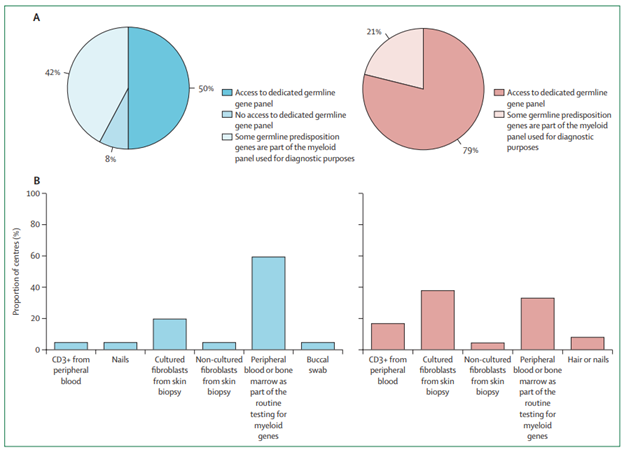This research from the European Society for Blood and Marrow Transplantation (EBMT) was conducted to determine how genetic testing is used and how to establish guidelines for testing genetic predisposition for myelodysplastic syndrome (MDS). Results report substantial variation in genetic testing practices across centers and suggest that the identification of a germline variant known to be linked to MDS pathobiology should prompt an automatic unrelated donor search to avoid potentially impacted familial donors and understand options for allogeneic hematopoietic cell transplant (alloHCT). Germline predisposition for MDS also has implications for donor selection since donors with these mutations may produce greater chances of donor-derived leukemia in the patient. This study emphasizes the importance of recognizing these variants using systematic and standardized methods.
Background
This research stems from the increasing awareness of germline (inherited) variants that predispose individuals to myeloid neoplasms, including MDS. Accurate identification of these variants is crucial for patient management, genetic counseling, donor selection, and therapeutic strategies. Although previously thought to be predominantly important in pediatric cases, recent studies have revealed that adults can also carry these predisposing variants. This realization underscores the need for guidelines in managing patients eligible for alloHCT, particularly with varying local policies and legislations present for genetic testing.
Methods
This research study engaged the MDS subcommittee of the EBMT's Chronic Malignancies Working Party and the Practice Harmonization and Guidelines committee to disseminate an electronic survey to select EBMT centers and a panel of 19 global experts in related fields. The survey aimed to capture the current European standards and expert opinions on evaluating germline predisposition for MDS in the context of alloHCT.
Results
The survey revealed significant variability among the 26 responding centers across 12 countries in aspects such as access to next-generation sequencing panels, DNA source for testing, screening criteria, and management strategies following the detection of a germline predisposition trait. Based on these findings, the expert panel developed suggested guidelines emphasizing the importance of genetic predisposition screening without age limitation, prioritizing pediatric and younger adults, and specific testing and interpretation protocols for germline variants. The guidelines also addressed genetic counseling, choice of conditioning, and follow-up for alloHCT recipients with germline predispositions. Results suggest that the identification of a germline variant known to be linked to MDS pathobiology should prompt an automatic unrelated donor search to avoid potentially impacted familial donors and understand options for alloHCT. Germline predisposition for MDS also has implications for donor selection since donors with these mutations may produce greater chances of donor-derived leukemia in the patient.
Key Takeaways
The study highlights the critical role of considering germline predispositions in the practice of alloHCT for MDS. Germline predisposition for MDS has implications for donor selection and the potential development of donor-derived leukemia, as well as the timing and importance of alloHCT as a curative treatment option. Researchers advocate for a multidisciplinary approach and referral to specialized centers, emphasizing the need for continued research in areas such as functional testing and management of mild hematological abnormalities in adults with inherited traits. The implementation of these guidelines can improve patient outcomes, encourage the use of unrelated donors, and standardize practices across providers.
Figure
This figure displays the variation in the type of panel used for germline testing (A) and the source of germline DNA (B). Blue indicates results from the EBMT centers, while red shows results from the expert panel.

Gurnari C, et al., published in The Lancet Haematology
